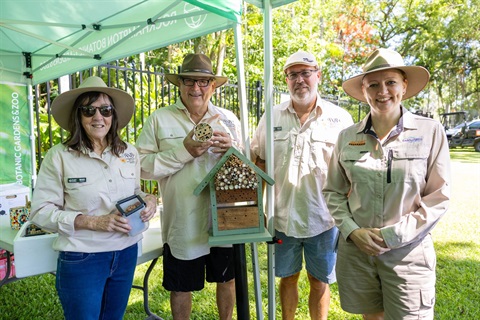
Rockhampton Zoo was buzzing with excitement this morning as more than 30 eager participants joined in the Zoo's first native bee hotel workshop, with a special focus on solitary bee nesting.
The hands-on event saw the group craft their own bee hotels to take home, creating safe nesting spaces for native bees right in their own backyards.
Parks, Sport and Public Spaces Councillor Cherie Rutherford said the workshop is part of a number of projects the Zoo is carrying out in partnership with the Australian Native Bee Association (ANBA), Rockhampton Branch.
"We're incredibly proud to be working with the ANBA Rockhampton Branch to shine a spotlight on native bees, and today's workshop has been a wonderful opportunity for locals to learn from experts and get involved in conservation efforts that they can then continue at home," Cr Rutherford said.
"A big part of the work the Rockhampton Zoo team carries out is education and conservation, and it's fantastic to have these efforts supported by external groups like the ANBA."
Rockhampton Zoo Director Liz Bellward said promoting the conservation of bees is crucial, with populations under threat globally.
"Native bees are often unsung heroes, and although small, are essential pollinators for many native plants and food sources that other wildlife rely on," Ms Bellward said.
"Unfortunately, bee populations around the world are under threat from habitat loss, disease, pesticides and more, so it's really important for us to highlight their importance.
"We've been housing stingless native bees in hives for many years at the Zoo, and we've recently introduced bee hotels to provide nesting spaces for the solitary bees that don't live in hives.
"Our latest and largest hotel was crafted by the volunteers of ANBA and attracted dozens of bees within the first week alone which goes to show how effective these efforts can be."
Australian Native Bee Association, Rockhampton Branch Chairperson Loyd Younger said today's workshop gave an opportunity for the community to see active conservation firsthand.
"Of the 1,700 species of native bees in Australia – only 11 species are social and live in hive communities," Mr Younger said.
"The rest are solitary bees and depend on safe spaces to nest and lay their eggs so creating man-made nests like bee hotels make it much easier for them to find shelter and nesting spaces.
"This has an important flow on effect as bees pollinate when they collect food to take back to their nests, and this pollination is what helps the regeneration of flowers, plants and foods.
"It's a remarkable process to watch, and the best part about creating bee hotels is that you can see it all unfold right in your own backyard.
"I've been working with bees for the better part of 30 years and still love being able to experience this."
Rockhampton Zoo's newest bee hotel can be found near the Dingo Enclosures.
The Zoo is open daily from 9:00am to 4:15pm (excluding Christmas Day), and admission is free.






